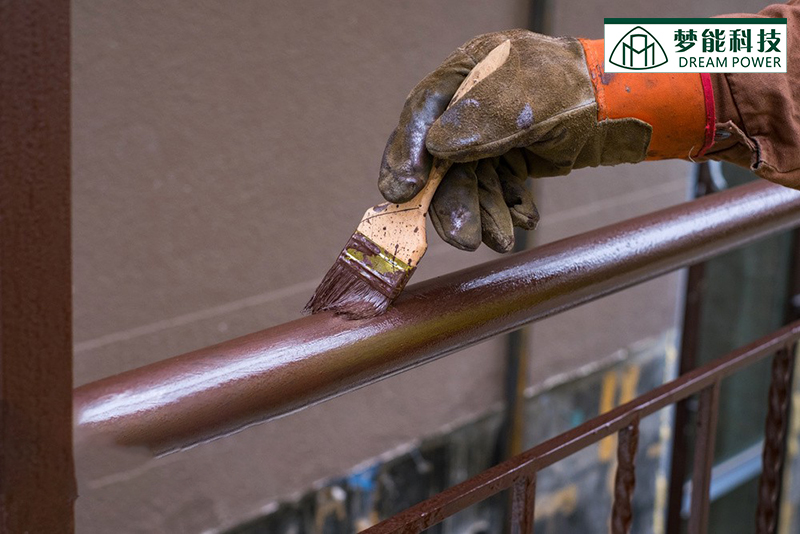Matching and Application of Anti-corrosion Primers for Steel Structures
Anti-Corrosion Coating Matching and Application
To meet the requirements of steel structure companies and anti-corrosion construction units, the focus here is on the matching and application of anti-corrosion coatings.

1. Epoxy Rust-Resistant Primer
The application principle of this coating on steel structures is mainly not based on chemical reactions with the rust layer's components, but rather through the resin's permeability, infiltrating, penetrating, and filling the loose and porous rust layer to form a continuous coating, thus sealing the entire rust layer and steel surface, isolating the external corrosive media from the rust layer, preventing the development of corrosion. This type of rust-resistant coating relies on active pigments and high-permeability epoxy resin, which, in combination with anti-corrosion pigments, stabilizes the rust and provides long-lasting anti-rust effects. The key feature is its good adaptability to rusty steel surfaces. Among the application methods, brushing is more conducive to the coating's penetration into the rust layer because the brush can apply pressure to promote the coating's penetration. The thickness of the coating is also an important factor affecting the penetration depth. After rusting, it becomes difficult for the coating to penetrate deep into the rust layer. To ensure the quality of rust-resistant coatings, the specified rust layer thickness is essential.
2. High Temperature Resistant Coating
High temperature resistant coatings refer to coatings that do not discolor, peel off, or lose physical and mechanical properties at temperatures above 200°C. They are widely used in chimneys, high-temperature steam pipelines, heat exchangers, high-temperature furnaces, petrochemical equipment, engine parts, and exhaust pipes. With the continuous development of anti-corrosion technology, the important role of high-temperature coatings has attracted global attention. Currently, high-temperature coatings are generally divided into organic and inorganic types. Pure silicone varnishes can withstand 200-250°C, while silicone-based coatings with metal fillers (such as silver paste) and glass components can withstand temperatures from 300°C to 700°C. Organic silicone high-temperature coatings have good heat resistance, water resistance, electrical insulation, and mechanical properties but have low hardness, poor flame resistance, and high prices. Inorganic high-temperature coatings can withstand temperatures of 450-500°C (inorganic zinc-rich heat-resistant coatings) and have good combustion resistance and high hardness. However, their water resistance is poor before complete curing, and substrate preparation is crucial. In recent years, to combine the strengths and compensate for weaknesses, organic resins and inorganic coatings are often combined or chemically modified into organic-inorganic hybrid high-temperature coatings, which is a future development trend.
3. Epoxy Zinc-Rich Primer
This primer is composed of zinc powder, epoxy resin, polyamide curing agents, etc., and can have up to 80% zinc powder content in the film (by weight). It offers excellent cathodic protection, corrosion resistance, mechanical wear resistance, heat resistance, and minimal film damage during welding and cutting. The dry film thickness of this primer is generally controlled at around 20 microns and has no negative impact on the steel welding process and quality. It can be used in combination with common topcoats like epoxy, chlorinated rubber, polyurethane, and acrylics. The corrosion protection of epoxy zinc-rich primer is achieved through both chemical and electrochemical protection, preventing steel corrosion, with a mechanism similar to inorganic zinc-based primers. However, its heat resistance and solvent resistance are not as good as inorganic zinc-rich primers. Due to its excellent anti-corrosion performance, it is most suitable for outdoor steel structures with long construction periods. It can also be used as an anti-corrosion coating for bridges, offshore facilities, tunnels, and other steel structures.
4. Chlorinated Rubber Ship Bottom Anti-Rust Coating
This special anti-rust coating is used for the bottom of ships. Since maintenance and repair are not possible during ship operation, the ship's bottom anti-rust coating must have long-lasting protection. The ship bottom anti-rust coating should meet the following conditions: good adhesion to metal surfaces, no peeling under prolonged immersion and water flow impact; low permeability to water and air, with no blistering or peeling in long-term immersion; quick drying to minimize construction time; excellent compatibility with anti-fouling coatings, with no separation or peeling between layers; good cathodic protection potential performance. The main function of the anti-rust coating is to prevent steel plate corrosion and improve the adhesion of anti-fouling coatings. Therefore, the anti-rust performance affects both the service life of the steel plate and the anti-fouling effect. Corrosion of steel in seawater is mainly caused by electrochemical corrosion due to the presence of about 3% sodium chloride in seawater, which is a strong electrolyte solution that causes electrochemical corrosion of metals. Thus, preventing corrosion of ship bottom steel plates is crucial. Chlorinated rubber anti-rust coatings have excellent anti-corrosion properties due to their low permeability to water vapor and oxygen. When applied as a thick paste primer, the ship's bottom can last for up to 5 years. The airless spray application can achieve a dry film thickness of 60 microns, reducing construction steps, saving time, and lowering costs. The coating dries quickly, allowing for application even in temperatures as low as -20°C. However, it should be noted that the coating layers are mutually soluble, with good interlayer adhesion, no time limit for re-coating, easy to repair, and excellent alkali resistance.
5. Mengneng Technology
Mengneng Technology is a company dedicated to the sales of coatings, solution design, and coating construction. Mengneng Technology specializes in industries such as EMI, industrial equipment manufacturing, bridge steel structures, petrochemical, special gases, thermal power, wind power, hydropower energy, and other heavy-duty anti-corrosion fields. Mengneng Technology provides comprehensive services, including recommending appropriate coating solutions during the design phase, offering high-quality products and services during cooperation, and providing excellent on-site construction technical guidance and quality after-sales service.